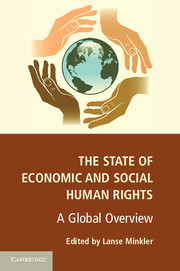Book contents
- Frontmatter
- Contents
- Contributors
- Acknowledgments
- 1 Introduction: Why Economic and Social Human Rights?
- I CORE RIGHTS
- 2 The Right to Food: A Global Perspective
- 3 Globalization and the Right to Health
- 4 Demolishing Housing Rights in the Name of Market Fundamentalism: The Dynamics of Displacement in the United States, India, and South Africa
- 5 Implementation of the Human Right to Social Security around the World: A Preliminary Analysis of National Social Protections Laws
- 6 Why Is the Right to Work So Hard to Secure?
- II NONDISCRIMINATION
- III META
- Index
- References
3 - Globalization and the Right to Health
Published online by Cambridge University Press: 05 February 2013
- Frontmatter
- Contents
- Contributors
- Acknowledgments
- 1 Introduction: Why Economic and Social Human Rights?
- I CORE RIGHTS
- 2 The Right to Food: A Global Perspective
- 3 Globalization and the Right to Health
- 4 Demolishing Housing Rights in the Name of Market Fundamentalism: The Dynamics of Displacement in the United States, India, and South Africa
- 5 Implementation of the Human Right to Social Security around the World: A Preliminary Analysis of National Social Protections Laws
- 6 Why Is the Right to Work So Hard to Secure?
- II NONDISCRIMINATION
- III META
- Index
- References
Summary
Introduction
Like many other economic and social rights, the recognition of a right related to health or health care is a relatively recent development. The Universal Declaration of Human Rights enumerates a right to a standard of living adequate for health and well-being that includes medical care (1948, Article 25). Article 12 of the International Covenant on Economic, Social and Cultural Rights (ICESCR; 1966) expands the conception of the right “to the highest attainable standard of physical and mental health” (referred to subsequently as the right to health). The broad brush strokes of Article 12 direct state parties to provide for maternal and child health; improve environmental and industrial hygiene; ensure prevention, treatment, and control of epidemic, endemic, occupational, and other diseases; and create conditions that would assure medical service and medical attention in the event of sickness to all.
There was considerable uncertainty about the precise requirements of the right and scope of state party responsibilities until 2000, when the United Nations Committee on Economic, Social and Cultural Rights (CESCR) adopted a general comment with its interpretation. According to the text of General Comment No.14 (GC 14), the right to health is an inclusive right that goes well beyond the four original provisions outlined in the ICESCR, which it characterizes as merely illustrative. The right to health is not understood as a right to be healthy (para. 8), but as the right to a variety of facilities, goods, services, and conditions necessary for the realization of the highest attainable standard of health (para. 9). These extend not only to the availability of timely and appropriate health care, but also incorporate the underlying determinants of health such as access to safe and potable water, adequate sanitation, an adequate supply of safe and nutritious food, healthy occupational and environmental conditions, and access to health-related education and information, including on sexual and reproductive health (para. 11). GC 14 emphasizes the special obligations of the state to provide for the satisfaction of the health needs of those whose poverty, disabilities, or background makes them more vulnerable (CESCR 2000, paras. 20–27). Like other general comments, GC 14 specifies three types of state responsibilities: the obligations to respect, protect, and fulfill the right (paras. 33–37).
- Type
- Chapter
- Information
- The State of Economic and Social Human RightsA Global Overview, pp. 61 - 85Publisher: Cambridge University PressPrint publication year: 2013
References
- 2
- Cited by



